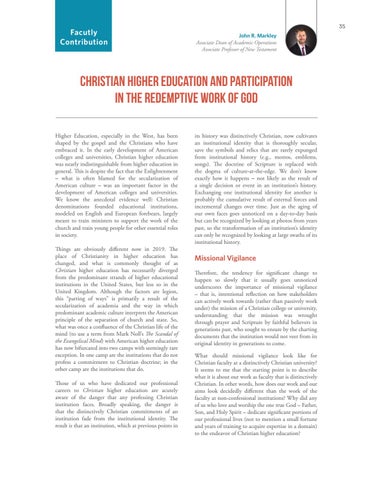Facutly Contribution
35 John R. Markley Associate Dean of Academic Operations Associate Professor of New Testament
CHRISTIAN HIGHER EDUCATION AND PARTICIPATION IN THE REDEMPTIVE WORK OF GOD Higher Education, especially in the West, has been shaped by the gospel and the Christians who have embraced it. In the early development of American colleges and universities, Christian higher education was nearly indistinguishable from higher education in general. This is despite the fact that the Enlightenment – what is often blamed for the secularization of American culture – was an important factor in the development of American colleges and universities. We know the anecdotal evidence well: Christian denominations founded educational institutions, modeled on English and European forebears, largely meant to train ministers to support the work of the church and train young people for other essential roles in society. Things are obviously different now in 2019. The place of Christianity in higher education has changed, and what is commonly thought of as Christian higher education has necessarily diverged from the predominant strands of higher educational institutions in the United States, but less so in the United Kingdom. Although the factors are legion, this “parting of ways” is primarily a result of the secularization of academia and the way in which predominant academic culture interprets the American principle of the separation of church and state. So, what was once a confluence of the Christian life of the mind (to use a term from Mark Noll’s The Scandal of the Evangelical Mind) with American higher education has now bifurcated into two camps with seemingly rare exception. In one camp are the institutions that do not profess a commitment to Christian doctrine; in the other camp are the institutions that do. Those of us who have dedicated our professional careers to Christian higher education are acutely aware of the danger that any professing Christian institution faces. Broadly speaking, the danger is that the distinctively Christian commitments of an institution fade from the institutional identity. The result is that an institution, which at previous points in
its history was distinctively Christian, now cultivates an institutional identity that is thoroughly secular, save the symbols and relics that are rarely expunged from institutional history (e.g., mottos, emblems, songs). The doctrine of Scripture is replaced with the dogma of culture-at-the-edge. We don’t know exactly how it happens – not likely as the result of a single decision or event in an institution’s history. Exchanging one institutional identity for another is probably the cumulative result of external forces and incremental changes over time. Just as the aging of our own faces goes unnoticed on a day-to-day basis but can be recognized by looking at photos from years past, so the transformation of an institution’s identity can only be recognized by looking at large swaths of its institutional history.
Missional Vigilance Therefore, the tendency for significant change to happen so slowly that it usually goes unnoticed underscores the importance of missional vigilance – that is, intentional reflection on how stakeholders can actively work towards (rather than passively work under) the mission of a Christian college or university, understanding that the mission was wrought through prayer and Scripture by faithful believers in generations past, who sought to ensure by the charting documents that the institution would not veer from its original identity in generations to come. What should missional vigilance look like for Christian faculty at a distinctively Christian university? It seems to me that the starting point is to describe what it is about our work as faculty that is distinctively Christian. In other words, how does our work and our aims look decidedly different than the work of the faculty at non-confessional institutions? Why did any of us who love and worship the one true God – Father, Son, and Holy Spirit – dedicate significant portions of our professional lives (not to mention a small fortune and years of training to acquire expertise in a domain) to the endeavor of Christian higher education?
